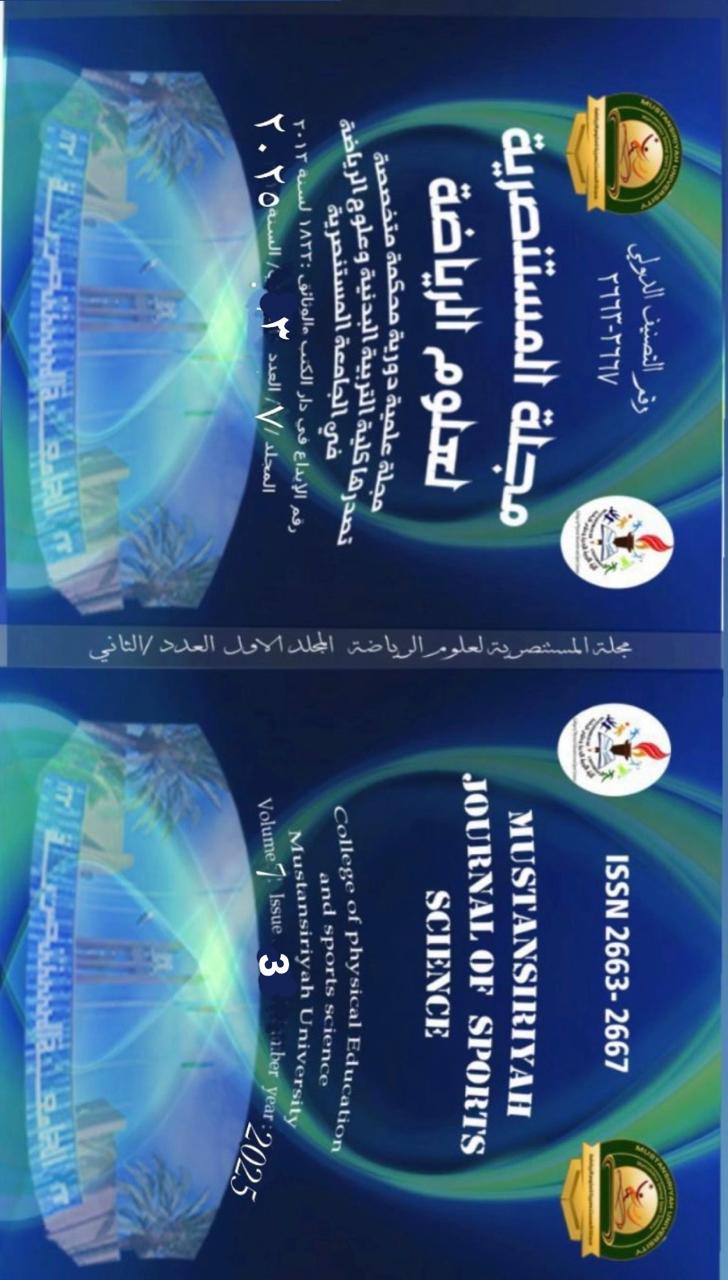Changes in Some Biochemical Indicators and Fatigue Index in Response to Magnesium Lactate Supplementation Combined with a Specialized Training Program in Advanced Basketball Players
Main Article Content
Abstract
This study aims to evaluate the effect of magnesium lactate supplementation, combined with an intensive 8-week training program, on changes in muscle enzyme levels (CpK, LDH) in basketball players. These changes will be compared with a control group following the same training program but without supplementation. The study aims to determine whether magnesium lactate supplementation contributes to improving muscle recovery capacity and affecting the fatigue index. The research objectives were to identify the effect of magnesium lactate supplementation combined with the training program on some biochemical variables and the fatigue index in the experimental research sample. The hypotheses were that there were statistically significant differences between the post-tests in the control and experimental groups. After applying the program for 8 weeks, several conclusions were reached, including that the dietary supplement has a clear effect on delaying fatigue (muscle endurance). The researcher recommended paying attention to nutritional supplements during training units, especially supplements that help produce energy and delay the onset of fatigue
Downloads
Article Details

This work is licensed under a Creative Commons Attribution-NonCommercial 4.0 International License.
References
Abu Al-Ala Ahmed Abdel Fattah: Sports Training: Physiological Foundations, 1st Edition, Dar Al-Fikr Al-Arabi, Cairo, 1995.
Abu Al-Ala Ahmed Abdel Fattah, Mohamed Sobhi Hassanein: Physiology and Morphology of Sports and Measurement Methods for Evaluation, 1st Edition, Dar Al-Fikr Al-Arabi, 1997, p. 229.
Sabrawan Hamed: The Effect of Using Creatine Phosphate Compound Loading on the Development of CPK Enzyme and the Achievement of 200m Runners, 2016.
Hayat Al-Sudan Ibrahim: Biochemistry of Enzymes in the Human Body, Amman, Afaq Al-Ilm Journal of Science and Knowledge, Issue 17, 2007.
Risan Khreibet Majid and Ali Turki Musleh: Sports Physiology, Dar Al-Shorouk for Publishing and Distribution, Amman, 1999, pp. 101-112.
Bravo M., Simón J., González-Recio I., Martinez-Cruz LA, Goikoetxea-Usandizaga N., Martínez-Chantar ML: Magnesium and Liver Metabolism Through the Lifespan. Adv. Nutr. 2023;14:739--751. doi: 10.1016/j.advnut.2023.05.009.
Fiorentini D., Cappadone C., Farruggia G., Prata C.: Magnesium: biochemistry, nutrition, detection and social impact of diseases associated with its deficiency. Nutrients. 2021;13:1136. doi: 10.3390/nu13041136.
Mindy Millard et al.: Serum CPK Levels in Male and Female World-Class Swimmers During a Swimming Season, Swimming Research, No. 2, 1985.
Rawson, E.S.; Miles, M.P.; Larson-Meyer, D.E. Dietary Supplements for Health, Adaptation, and Recovery in Athletes. Int. J. Sport Nutr. Exerc. Metab. 2018, 28, 188–199.
- Peeling, P.; Castell, L.M.; Derave, W.; de Hon, O.; Burke, L.M. Sports Foods and Dietary Supplements for Optimal Function and Performance Enhancement in Track-and-Field Athletes. Int. J. Sport Nutr. Exerc. Metab. 2019, 29, 198–209
Maughan, R.J.; Shirreffs, S.M. Nutrition for sports performance: Issues and opportunities. Proc. Nutr. Soc. 2012, 71, 112–119.
- Vitale, K.; Getzin, A. Nutrition and Supplement Update for the Endurance Athlete: Review and Recommendations. Nutrients 2019, 11, 1289.
- Fernandez, M.S.d.S.; et al. The effects of Coenzyme Q10 on biochemical markers and physical performance in team sport athletes. Nutrients 2023, 15, 3990.
- Talebi, S.; Pourgharib Shahi, M.H.; Zeraattalab-Motlagh, S.; Asoudeh, F.; Ranjbar, M.; Hemmati, A.; Talebi, A.; Wong, A.; Mohammadi, H. The effects of coenzyme Q10 supplementation on biomarkers of exercise-induced muscle damage, physical performance, and oxidative stress: A GRADE-assessed systematic review and dose-response meta-analysis of randomized controlled trials. Clin Nutr ESPEN. 2024, 60, 122–134.

